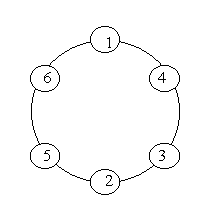HDU-1016 Prime Ring Problem
Description
A ring is compose of n circles as shown in diagram. Put natural number 1, 2, ..., n into each circle separately, and the sum of numbers in two adjacent circles should be a prime.
Note: the number of first circle should always be 1.
Input
n (0 < n < 20).
Output
The output format is shown as sample below. Each row represents a series of circle numbers in the ring beginning from 1 clockwisely and anticlockwisely. The order of numbers must satisfy the above requirements. Print solutions in lexicographical order.
You are to write a program that completes above process.
Print a blank line after each case.
Sample Input
6
8
Sample Output
Case 1:
1 4 3 2 5 6
1 6 5 2 3 4
Case 2:
1 2 3 8 5 6 7 4
1 2 5 8 3 4 7 6
1 4 7 6 5 8 3 2
1 6 7 4 3 8 5 2
#include <iostream>
#include <cmath>
using namespace std;
int d[30], num[30], n;
bool func(int);
int main(void)
{
void dfs(int);
int times = 0;
while(cin >> n)
{
times++;
cout << "Case " << times << ':' << endl;
memset(d, 0, sizeof(d));
d[1] = 1;
num[0] = 1;
dfs(1);
cout << endl;
}
return 0;
}
void dfs(int t)
{
if(t == n)
{
if(!func(num[n-1]+1))
return;
for(int i = 0; i < n-1; i++)
{
cout << num[i] << ' ';
}
cout << num[n-1] << endl;
return;
}
for(int i = 2; i <= n; i++)
{
if(!d[i] && func(i+num[t-1]))
{
num[t] = i;
d[i] = 1;
dfs(t+1);
d[i] = 0;
}
}
return ;
}
bool func(int a)
{
int q = sqrt(a);
for(int i = 2; i <= q; i++)
{
if(a%i == 0)
return false;
}
return true;
}



